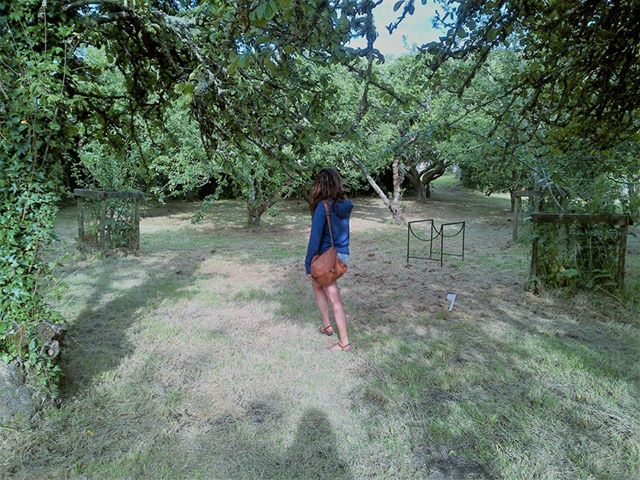Community
A perfectly Pembrokeshire perspective – by Cara Jasmine Bradley

Budding young travel writer Cara Jasmine Bradley writes about her experience at visiting Pembrokeshire last summer
IT WAS the moment that saw all my childhood dreams come true in a dramatic flurry afore my eyes.
The hoof beats below me intensified, and I laughed as I was showered in a mixture of sand and sea spray. The wind slapped at my face in refreshing fashion as we thundered along, tearing up the surf.
Slicing into the waterfall of rain, I felt overwhelmingly empowered and alive. I wanted the descending coastline to spiral onwards forever.
Towering cliffs doused in pulsating spillages of shrubbery dwarfed the cove on either side, creating an illuminating spotlight to my disposition.

The grey clouds overhead created a quintessential backdrop to the bursts of colour created by the blissful clash of the sea and its surrounding rolling meadows.
Leaning forwards, I embraced the rain and my every spine-tingling sensation, and allowed the horse to pick up his pace another notch. The feeling of sheer freedom was indescribable.
Pembrokeshire: the place that presented me with one of the most invigorating memories of my life.
Galloping along a deserted stretch of Haverfordwest beach truly made up the ingredients for the stuff dreams are made of. The drum of the hooves replicated my bursting heart, and I scarcely recalled a time I had felt more joyous.
It was the promise of horse riding on the beach that had initially enticed me to Pembrokeshire that summer, but it was the treasured alternate elements that sum up the mystical county that have kept my heart alight ever since.

Pembrokeshire quickly enlightened me the depth of its rural charm, showcasing just what the UK does best: nature. We arrived at our caravan that first evening to find that we already had our first visitor ready and waiting for us at the door. In the gathering dusk, the silhouette of a badger made my breath catch in my throat. I had never been in such close proximity to one before! The badger boldly held eye contact for a few seconds, before scuttling off, only to return every night!
Perhaps it was the prime location of our caravan that won me over. An overgrown pathway led us away from the caravan park. We passed by the towering wall of bold foxgloves and followed the aroma of sea salt until we found ourselves in an open field, which boasted astounding views out across the sea via the craggy cliff-side beyond.
Watching the sun set from that very spot became a nightly tradition that never failed to motivate and mesmerize.
The declining sun dropped an explosion of blood orange across the cliffs, sending its rays clambering across the still surface of the sea far into the horizon. It felt as though I was stood on the brink of the eye to the world, gazing at its magnificence through a magnifying glass.
Famed for its paradise perfect beaches that behold the ability to make one believe that they could actually be anywhere in the world, Pembrokeshire also modestly lets fans into its sacred secret of outstanding countryside.
It’s easy to get lost in the endless woodlands and forests spread generously across Pembrokeshire. And by ‘lost,’ I also mean in the metaphorical sense of the word, for it is almost impossible not to abort all of life’s worries and negativities under the protection of the rich canopy of trees.

Enchanted pathways zig-zagging through the heart of dense woodland defines a magical fairytale setting intent on inspiring.
The woods were stunningly silent, aside the therapeutic droplets of rain cascading from the branches. The air was thick with the revitalising smell of nature – that tantalising ambiance that can only truly be appreciated after the rainfall.
The blackberries sat plump on their bushes, squirrels darted across the undergrowth in our wake, and mysterious flora and fauna shimmered in delight amidst the showers.
There was just something about trekking through the superlative forests that made me feel like a child again; uncontrollably wide-eyed with admiration and enthrallment. The scenery that generously enveloped me was so beautiful, so surreal, that I felt as though I was floating through a pleasant day-dream. You almost find yourself checking tree trunks for signs of fairies, resisting the urge to jump in puddles, and making wishes out of dandelions. Even the most cynical of adults would fail to fall victim to the spell.
Sharing my time with this mind-blowing landscape forced me to shrug off my stifling coat of conformity and simply be myself. I was walking hand in hand with the person I had almost forgotten to be. I was awakened, and my soul followed suit.
Quite often during our trip, we would pack our bags with a picnic, which we would relish half way through our lengthy walks, nestled somewhere between the forests and the coast. There is something quite thrilling about a mid-hike picnic. Rain sodden sandwiches tarnished with stray flecks of sand are part of the deal in the UK, and you know what? It only adds to the authenticity! Fleshly picked blackberries enhanced the flavour of the day, their tangy bitterness somewhat ruled out by the pride of souring and picking our own desserts straight from the trees!

One morning, we took a drive into a nearby town, enjoying the serene sights that walled the country lane ahead of us. We pulled over to catch a better glimpse of the sea from a particularly high spot en-route, and stumbled across a vast orchard adjacent to the cliffs. The lazy morning sun shone through the branches of the trees, the golden rays of its glow making patterns waltz underfoot. The scent of ripe, sweet apples drifted along the breeze, accompanied by the light buzz of the appreciative bees.
The time I spent walking around the orchard, lost in thought, was perhaps not as significant as my spectacular ride across the beach, but it is equally as memorable in terms of unrivalled serenity.
During our time in Pembrokeshire, we frequented a variation of dainty villages and towns, from Broad Haven to Tenby. Doused in a vibrant olde-worlde fishing village charm, Tenby was undeniably as pretty as it was wealthy in culture. With pastel-coloured houses rising above the coast, Tenby is a nostalgia-provoking location that posses the power to escort all of us back to care-free childhood afternoons spent on the timeless beaches of the UK.
A drive through Pembrokeshire will reveal a whole trove of hidden gem villages, quivering with the prospect of being uncovered.
Pembrokeshire ferociously ticks off the credentials for the most desirable trip. Combining pearly sands, twinkling seas, electrifying countryside, adorable towns, and endless adventures to be indulged and shared, this is what makes us so proud of our wondrously versatile United Kingdom.
Community
Tesco shoppers in Pembs called to help raise funds for food allergy charity

SHOPPERS in Pembrokeshire are being encouraged to help an in-store fundraising campaign from Monday 22nd to Sunday 28th April to support medical research into food allergies.
For the fifth year running, Tesco is working with The Natasha Allergy Research Foundation, the UK’s food allergy charity, to help raise awareness and support clinical research into food allergies by contributing 10p from every own brand Free From product bought in stores and online, as well as providing customers with the opportunity to round up their shopping at self-service tills throughout the week.
All money raised will help Natasha’s Foundation to continue its research into reducing the risks of food allergies and further developments into the management of allergies.
In addition to the funds being raised, the campaign aims to increase awareness in Pembrokeshire about the importance of understanding food allergies and clearly highlighting ingredients in food which can cause allergic reactions.
Natasha’s Foundation was founded in 2019 by Tanya and Nadim Ednan-Laperouse following the tragic loss of their daughter Natasha who had a fatal allergic reaction to a baguette that contained sesame seeds that were not listed on the packaging.
Tanya Ednan-Laperouse OBE, said: “We’re thrilled that Tesco is supporting us for the fifth year running. Allergen awareness is so important, and money raised in previous years has helped to fund clinical research exploring the management of food allergies.”
Oonagh Turnbull, Head of Health Campaigns at Tesco, said: “The work that Natasha’s Foundation has done to date has been fantastic and we are delighted to be able to support this for a fifth year.
“There are now 175 products in our Free From range, from meals and desserts to snacks, all created with great taste but without any of the allergens. We welcome any shoppers in Pembrokeshire to try these products or kindly round up their shopping at the self-service tills to help raise money for a fantastic cause.”
Natasha’s Foundation is committed to raising awareness and funds for critical food allergy research. But the real impact of the charity’s work lies in the lives it can change.
Millions of people live with food allergies in the UK and must navigate a world where seemingly simple acts, like grabbing a quick bite to eat, can become fraught with danger. It can affect anyone, at any age.
Billie Hoque, a commercial manager for a maritime security company, from Luton, has three allergic children – Jess, aged 7, Jude, 4, and Jayde, three months.
Billie, 35, said: “Food allergies first entered our lives when my son Jess was born in February 2017. From birth, Jess was presenting symptoms of allergies, yet I didn’t know it at the time. His constant discomfort and breathing troubles led to numerous doctor visits only to be dismissed as new-mum worries, and I felt unheard and alone.
“The switch from breastmilk to formula was a turning point. After initial acceptance, Jess refused all feeds for three days. When he finally ate, he became violently ill and struggled to breathe. Calls to an emergency doctor offered little help, and when he was prescribed “thicker milk” it triggered a terrifying reaction. This was his first anaphylactic reaction, and the first time the doctor diagnosed him as having a severe milk protein allergy.
“The loneliness and isolation I felt from becoming an allergy parent were all-consuming. The family and friends who I had been closest to, quickly became the ones who made me feel the most alone. They didn’t understand or seem to take seriously what I was going through.
Billie continued: “Life changed for me in June 2021 when I found The Natasha Allergy Research Foundation. I found a community – parents united by the fight for awareness. Meeting Nadim and Tanya, who lost their daughter Natasha to allergies, laid bare the heartbreaking truth of this condition. Yet, their strength resonated deeply.
“Though every single allergy story and experience shared through Natasha’s Foundation was different, the community all had one thing in common; we understood the fear, the loneliness, and the exhaustion of the continuous battling needed to keep our children alive. This community transformed me. No longer alone, I found strength and inspiration among these incredible people.
“Today, my purpose is clear. With this supportive network and a collective voice, we can raise awareness and fight for a future free from food allergies. This journey not only saved my sons, but it has also saved me too. I’d urge everyone to support the fantastic work of The Natasha Allergy Research Foundation and their goal of making food allergies history through research and raising awareness of food allergies.
“Tesco’s Free From range offers my children a chance to be included in all the tasty treats other children enjoy. Their clear labelling on the front of the packaging is not only helpful to me but is easy enough for my 7-year-old to clearly see that a food is safe for him. This limits the anxiety he has around eating new foods.”
Community
Cardigan Radio launches daily live broadcasts

Cardigan Radio/Radio Aberteifi says it is excited to announce a new line up of daily live broadcasts starting every evening from 7 PM at www.cardiganinternetradio.wales. Live shows will be hosted
by founder and presenter Bobby Kelly and other dedicated volunteer members.
The Cardigan Radio stream is constantly alive with great music that spans various genres, providing something for everyone. Listeners are encouraged to tune in and experience the quality and diversity of
Cardigan Radio’s programming for themselves.
You can listen 24/7 not only through their website www.cardiganinternetradio.wales but also on platforms such as Online
Radio Box and Radio Garden.
Online Radio Box: https://onlineradiobox.com/uk/cardiganinternet/
Radio Garden: https://radio.garden/visit/cardigan/DyV8OcNC
Interested in getting more involved? Cardigan Radio is always looking
for passionate volunteers to join our team. Whether you’re keen on
presenting, handling tech, or engaging with the community, we’d love to
hear from you. Contact us at [email protected] or call
01239 543025.
Connect with us on Facebook for updates and more information:
https://www.facebook.com/groups/friendsofcardiganradio
https://www.facebook.com/RadioCardigan
Tune in to Cardigan Radio and discover your new favourite sound!
If you’re interested in being a guest on our station, whether remotely
or in one of our member’s studios, we’d love to hear from you!
Community
Pembrokeshire’s ‘Pure West Radio’ celebrates sixth birthday

THERE ain’t no birthday like a Pure West birthday!
Pure West Radio – Pembrokeshire’s multi-award-winning radio station is celebrating its sixth birthday this month – and is ready to move up a gear when it starts broadcasting on DAB later this summer.
Pure West, which now has a staff of 12, and a team of over 90 volunteers bringing news, sport, entertainment and information to the airwaves of Pembrokeshire, celebrated its sixth anniversary on April 4 – and decided to share its celebrations with its loyal listeners – giving no fewer than 1,100 of them free tickets to some top local events.
For the Pure West Team the birthday was marked with a staff party at Seven Spice in Haverfordwest – but for listeners the treats were more varied.
Pure West Radio joined forces with Ocky White Travel – itself celebrating a 60th anniversary – to give away a cruise holiday to one lucky winner. On April 3 nurse Ffion Thomas, from Johnston, was announced as the winner of the seven-day P&O cruise to the Norwegian Fjords. She is taking her mum along with her as a 60th birthday treat when the Iona sets sail from Southampton on May 18.
And the giveaways didn’t stop there… Mark Edwards kindly shared 100 free tickets for a celebratory Silent Disco at Eddie Rocks, in Haverfordwest, that were snapped up within an hour – so a hundred more were released; Pure West Radio also teamed up with Hangar 5, also in Haverfordwest, and offered two one-hour free bounces for listeners, but again demand far outweighed expectations, so another hour’s bounce was provided.
In addition, Pure West Radio joined forces with The Palace Cinema, in Haverfordwest, for a free showing of Shrek – the Movie – but, yet again, a second showing had to be booked to accommodate all those who wanted tickets.
And sports fans haven’t been left out of the party – Haverfordwest County AFC, media partners of Pure West, have supplied 100 free tickets for the Bluebrids final home game of the season against Colwyn Bay to the broadcaster’s listeners.
“Our birthday celebrations were immense,” said Toby Ellis, Station Manager, “We gave away 1,100 free tickets to local events to make sure our dedicated listeners and followers were able to join in the party… putting a smile on the faces of more than a thousand Pembrokeshire people.
“And while the birthday celebrations are winding down – Pure West Radio – the only radio station based in Pembrokeshire – is gearing up for the next phase in our story.
“The licence for DAB broadcasting is in place – and we hope to go live within the next few months.
“We’ve expanded our staff and are currently looking for a full-time show producer – so anyone interested should email [email protected] to find out more, and we have some new sponsors – Ocky White Travel is now the official sponsor of Pure West’s daytime show and Folly Farm sponsors the breakfast show.
“And we’ve teamed up with yet more Pembrokeshire businesses who are taking advantage of our huge reach to spread their message across the county.
“There really is something for everyone on Pure West Radio – tune in via app, smart speaker and check out our website for the latest going on in Pembrokeshire, he added.”
-

 Business2 days ago
Business2 days agoBluestone National Park Resort payments expected to end
-

 Community4 days ago
Community4 days agoThe Harbourmaster: Special rail excursion draws crowds to Milford Haven
-

 News3 days ago
News3 days agoDragon LNG ‘monitoring’ scrap car blaze in Waterston
-

 News4 days ago
News4 days agoSearch for Luke, 19, reported missing in the Pembroke Dock area, continuing
-

 News23 hours ago
News23 hours agoSearch for missing teenager Luke continues at Pembroke Dock
-

 News5 days ago
News5 days agoMajor search in the area of The Cleddau Bridge and Hobbs Point
-

 Crime2 days ago
Crime2 days agoEstate agents admit health and safety failings following fatal market incident
-

 News1 day ago
News1 day agoMan jailed after scarring police officer in Narberth altercation
























